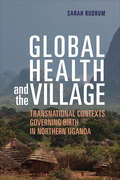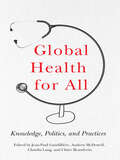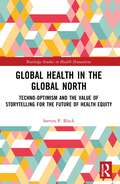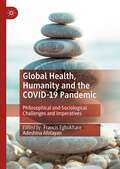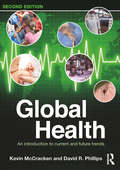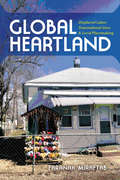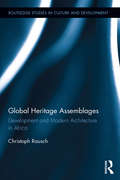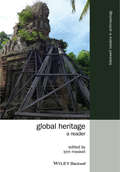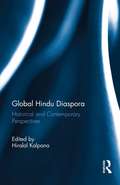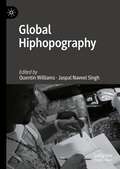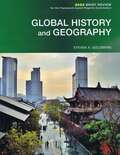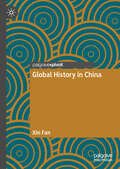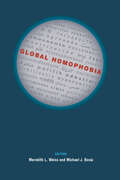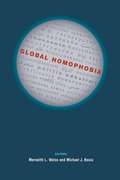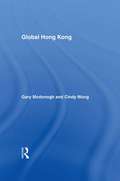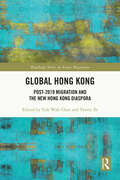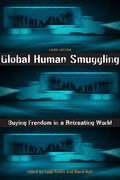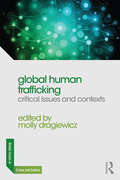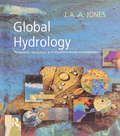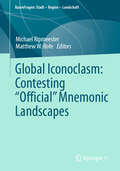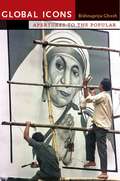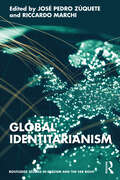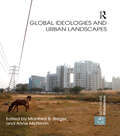- Table View
- List View
Global Health and the Village: Transnational Contexts Governing Birth in Northern Uganda
by Sarah RudrumThe accounts of women navigating pregnancy in a post-conflict setting are characterized by widespread poverty, weak infrastructure, and inadequate health services. With a focus on a remote rural agrarian community in northern Uganda, Global Health and the Village brings the complex local and transnational factors governing women’s access to safe maternity care into view. In examining local cultural, social, economic, and health system factors shaping maternity care and birth, Rudrum also analyzes the encounter between ambitious global health goals and the local realities. Interrogating how culture and technical problems are framed in international health interventions, Rudrum reveals that the objectifying and colonizing premises on which interventions are based often result in the negative consequences in local healthcare.
Global Health for All: Knowledge, Politics, and Practices
by Jean-Paul Gaudillière Christoph Gradmann Claudia Lang Laurent Pordié Claire Beaudevin Anne M. Lovell Andrew McDowell Olivia Fiorilli Lucile Ruault Caroline Meier Biesen Jessica Pourraz Vegard Traavik Sture Mandy Geise Sameea Ahmed Hassim Fanny Chabrol Simeng WangGlobal Health for All trains a critical lens on global health to share the stories that global health’s practices and logics tell about 20th and 21st century configurations of science and power. An ethnography on multiple scales, the book focuses on global health’s key epistemic and therapeutic practices like localization, measurement, triage, markets, technology, care, and regulation. Its roving approach traverses policy centers, sites of intervention, and innumerable spaces in between to consider what happens when globalized logics, circulations, and actors work to imagine, modify, and manage health. By resting in these in-between places, Global Health for All simultaneously examines global health as a coherent system and as a dynamic, unpredictable collection of modular parts.
Global Health in the Global North: Techno-Optimism and the Value of Storytelling for the Future of Health Equity (Routledge Studies in Health Humanities)
by Steven P. BlackThis book investigates how health interventions are imagined into being in high-income countries, drawing on over seven years of fieldwork in the self-described “global health capital” Atlanta to consider the role of storytelling in the construction of global health futures.The volume highlights the ways in which scientific storytelling is critical to our understanding of how global health futures are constructed. The book examines three value types—epistemic, ethical, and economic—central to contemporary global health and three linguistic and communicative phenomena—multimodal poetics, emplotment, and discursive circulation—significant to the constitution of these values through storytelling. In spotlighting the Atlanta metropolitan region, home to a number of prominent organizations and figures in the development of global health, the book showcases deeper insights into the future-oriented and techno-optimistic stories global health professionals tell each other, funders, and the public. Black builds on these discussions to suggest ways forward for these stories to be improved to foster greater equity and decolonization and re-imagine the future of global health.This book will be of interest to students and scholars in linguistic anthropology, medical anthropology, global health, and health humanities.
Global Health, Humanity and the COVID-19 Pandemic: Philosophical and Sociological Challenges and Imperatives
by Adeshina Afolayan Francis EgbokhareThis volume interrogates global health and especially the scourge of the COVID-19 pandemic, and the role that science has played in mitigating the human experiences of pandemics and health over the centuries. Science, and the scientific method, has always been at the forefront of the human attempt at undermining the virulent consequences of sicknesses and diseases. However, the scientific image of humans in the world is founded on the presumption of possessing the complete understanding about humans and their physiological and psychological frameworks. This volume challenges this scientific assumption. Global health denotes the complex and cumulative health profile of humanity that involves not only the framework of scientific researches and practices that investigates and seeks to improve the health of all people on the globe, but also the range of humanistic issues - economic, cultural, social, ideological - that constitute the sources of inequities and threat to the achievement of a positive global health profile. This volume balances the argument that diseases and pandemics are human problems that demand both scientific and humanistic interventions.
Global Health: An Introduction to Current and Future Trends
by David R. Phillips Kevin MccrackenGlobal Health continues to provide readers with a comprehensive, up-to-date and thought-provoking outline and understanding of the constantly evolving global health landscape. In this new edition the authors have maintained the successful structure and organisation of the previous edition to examine and explain recent health changes and consider likely future patterns. New or expanded topics covered include: emerging and re-emerging infectious disease threats increasing awareness of, and interest in, antimicrobial resistance and superbugs terrorism, global conflict and health the new UN 2030 Agenda for Sustainable Development the drive for Universal Health Coverage (UHC) the use of information technology in global health substance abuse palliative and end-of-life-care ethical issues in global health. Using clear and original explanations of complex issues, this text makes extensive use of boxed case studies and international examples, with discussion questions posed for readers at the end of each chapter. Readers will also be able to take advantage of the new website that was designed to complement this book. Global Health is essential reading for students and researchers of global health, public health and development studies.
Global Heartland
by Faranak MiraftabGlobal Heartland is the account of diverse, dispossessed, and displaced people brought together in a former sundown town in Illinois. Recruited to work in the local meat-processing plant, African Americans, Mexicans, and West Africans re-create the town in unexpected ways. Drawing on ethnographic research conducted in the US, Mexico, and Togo, Faranak Miraftab shows how this workforce is produced for the global labor market; how the displaced workers' transnational lives help them stay in these jobs; and how they negotiate their relationships with each other across the lines of ethnicity, race, language, and nationality as they make a new home. Beardstown is not an exception but an example of local-global connections that make for local development. Focusing on a locality in a non-metropolitan region, this work contributes to urban scholarship on globalization by offering a fresh perspective on politics and materialities of placemaking.
Global Heartland: Cultivating the American Century on the Midwestern Farm
by Peter SimonsHighlighting the critical role of midwestern farmers in the creation of the American Century Though often left out of the story of the making of the American Century, the farmers of the Midwest were at its center, fueling the nation&’s growing power in the midtwentieth century. In Global Heartland, Peter Simons explores how, after decades of slipping to the margins of an urbanizing economy, these farmers assumed renewed strategic and cultural importance as they produced essential sustenance for overseas troops and food rations for a domestic population. During the mid-1900s, once-isolationist midwestern farmers came to see the continental interior not as an insulated space but as an environmentally rich landscape that mandated them to accept a larger stake in global affairs. Simons traces this transformation from an older agrarian internationalism rooted in religion and ties to family abroad to illuminate the increasing influence of the U.S. agricultural community during the Cold War. Examining regional political parties, Lend-Lease programs, wartime mass media, and farmer-led relief programs, and interspersing this history with vignettes revisiting the Mercy Wheat campaign of 1947, the postwar International Farm Youth Exchange, and the Flying Farmers organization, Simons offers an enlightening consideration of midwestern farmers&’ involvement in America&’s international ascent. Unique in its focus on farmers and their work rather than the more common attention to food or agricultural commodities, Global Heartland complicates and expands ideas of the farm industry&’s role in American history.
Global Heritage Assemblages: Development and Modern Architecture in Africa (Routledge Studies in Culture and Development)
by Christoph RauschUNESCO aims to tackle Africa’s under-representation on its World Heritage List by inscribing instances of nineteenth- and twentieth-century modern architecture and urban planning there. But, what is one to make of the utopias of progress and development for which these buildings and sites stand? After all, concern for ‘modern heritage’ invariably—and paradoxically it seems—has to reckon with those utopias as problematic futures of the past, a circumstance complicating intentions to preserve a recent ‘culture’ of modernization on the African continent. This book, a new title in Routledge’s Studies in Culture and Development series, introduces the concept of ‘global heritage assemblages’ to analyse that problem. Based on extensive anthropological fieldwork, it describes how various governmental, intergovernmental, and non-governmental actors engage with colonial and post-colonial built heritage found in Eritrea, Tanzania, Niger, and the Republic of the Congo. Rausch argues that the global heritage assemblages emerging from those examples produce problematizations of the modern’, which ultimately indicate a contemporary need to rescue modernity from its dominant conception as an all-encompassing, epochal, and spatial culture.
Global Heritage: A Reader (Wiley Blackwell Readers in Anthropology)
by Lynn MeskellExamines the social, cultural and ethical dimensions of heritage research and practice, and the underlying international politics of protecting cultural and natural resources around the globe. Focuses on ethnographic and embedded perspectives, as well as a commitment to ethical engagement Appeals to a broad audience, from archaeologists to heritage professionals, museum curators to the general public The contributors comprise an outstanding team, representing some of the most prominent scholars in this broad field, with a combination of senior and emerging scholars, and an emphasis on international contributions
Global Hindu Diaspora: Historical and Contemporary Perspectives
by Hiralal KalpanaThis book examines Hinduism from both a historical and contemporary perspective. It provides some interesting insights into factors that shaped and defined Hinduism in the diaspora. It also examines the challenges facing Hinduism in the twenty-first century. In recent years the growing conversions of Hindus to other religions, the complexities of caste, the impact of AIDS, and the need to reinvigorate the youth in Hindu teachings are just some of the issues that it faces. What shape and form will Hinduism take in the twenty-first century? What will Hinduism look like in the future? These relevant questions are the subject of debate and deliberations amongst religious scholars, academics and politicians. This edited collection addresses some of these questions as well as the relationship between religion and diaspora within historical and contemporary perspectives.
Global Hiphopography
by Quentin Williams Jaspal Naveel SinghThis book brings together a range of hip hop scholars, artists and activists working on Hip Hop in the Global North and South with the goal of advancing Hiphopographic research as a critical methodology with critical fieldwork methods that can provide a critical perspective of our world. The authors’ focus in this volume is to present an anthology of essays that expand the remit of Hiphopography as an approach to the study of Hip Hop that is not only sensitive to the social, economic, political and cultural lives of Hip Hop Culture participants as interpreters and theorists, but one that continues to humanize the “whole person” behind the decks, on the mic, rocking on the linoleum floor, painting in front of a wall, and seeking that Knowledge of Self. This book will be relevant to Hip Hop scholars in fields such as cultural studies and history, sociolinguistics, linguistic anthropology and ethnography, and race studies, while Hip Hop heads themselves will find parts of this book that represent their culture in ethical and informative ways.
Global History and Geography: 2020 Brief Review for the Framework-based Regents Examination
by Steven A. GoldbergThis book has been written to help the students review the Global History and Geography Course. The features are: Detailed content review of key concepts and skills, Information on recent global events and international policies, Document-based question practice, Questions for Regents Practice, Strategies and skills the students will need to apply their social studies knowledge to the Regents Examination.
Global History in China
by Xin FanThis book explores global history as an emerging field of scholarly studies in China today. Readers are invited to rethink the origin of global history in China and to examine its current state. Chinese scholarship is rooted in a warm appreciation of globalization in the age of Opening-up and Reform and presented as a trendy transnational intellectual movement at the opening of the twenty-first century. On the one hand, global history claims an identity of the “new” eager to criticize the Eurocentric bias embedded in the narratives of the “old,” ones from world history; on the other hand, as an emerging field, it is yet to face competitions from national histories and area studies, which are nurtured by latest state initiatives with outspoken political agendas. As a whole, global history captures Chinese scholars’ tenacious interest in studying globalization through the lens of history. This book will interest historians, China scholars, and those trying to grasp the “Chinese perspective” on the world.
Global Homophobia: States, Movements, and the Politics of Oppression
by Michael J. Bosia Meredith L. Weiss Christine Keating Mark Blasius Amy Lind Conor O'Dwyer David K Johnson Kapya J Kaoma Katarzyna Korycki Abouzar Nasirzadeh Sami ZeidanWhile homophobia is commonly characterized as individual and personal prejudice, this collection of essays instead explores homophobia as a transnational political phenomenon. Editors Meredith L. Weiss and Michael J. Bosia theorize homophobia as a distinct configuration of repressive state-sponsored policies and practices with their own causes, explanations, and effects on how sexualities are understood and experienced in a variety of national contexts. The essays cover a broad range of geographic cases, including France, Ecuador, Iran, Lebanon, Poland, Singapore, and the United States. Combining rich empirical analysis with theoretical synthesis, these studies examine how homophobia travels across complex and ambiguous transnational networks, how it achieves and exerts decisive power, and how it shapes the collective identities and strategies of those groups it targets. The first comparative volume to focus specifically on the global diffusion of homophobia and its implications for an emerging worldwide LGBT movement, Global Homophobia opens new avenues of debate and dialogue for scholars, students, and activists. Contributors are Mark Blasius, Michael J. Bosia, David K. Johnson, Kapya J. Kaoma, Christine (Cricket) Keating, Katarzyna Korycki, Amy Lind, Abouzar Nasirzadeh, Conor O'Dwyer, Meredith L. Weiss, and Sami Zeidan.
Global Homophobia: States, Movements, and the Politics of Oppression
by Michael J. Bosia Meredith L. WeissWhile homophobia is commonly characterized as individual and personal prejudice, this collection of essays instead explores homophobia as a transnational political phenomenon. Contributors theorize homophobia as a distinct configuration of repressive state-sponsored policies and practices with their own causes, explanations, and effects on how sexualities are understood and experienced in a range of national contexts. The essays include a broad range of geographic cases, including France, Ecuador, Iran, Lebanon, Poland, Singapore, and the United States.
Global Hong Kong (Global Realities #Vol. 2)
by Gary McDonogh Cindy WongGlobal Hong Kong locates Hong Kong in the contemporary globalizing world. Hong Kong, as the authors argue, is an archetypal place, sitting at the intersection of East and West. It is also a major center for global capital flows and world trade. Moreover, in recent years, the island's global cultural power has become increasingly evident, as Hong Kong popular culture has spread to the West via a booming film industry. While looking at issues of postcoloniality, transnationalism and economic globalization, Wong and McDonogh focus on the new cultures and social formations of contemporary Hong Kong, as well as the transformation of the physical city itself. They also trace the new interconnections - economic, demographic, social and cultural - between Hong Kong and other parts of the worldthat have benn fostered by globalization.Books in this series look at how nations and regions across the world are navigating the tumultuous currents of globalization. Concise, descriptive, interdisciplinary, and theoretically informed, they serve as ideal introductions to the peoples and places of our increasingly globalized world.
Global Hong Kong: Post-2019 Migration and the New Hong Kong Diaspora (Routledge Series on Asian Migration)
by Yuk Wah Chan Yvette ToThis book examines the most recent outmigration waves from Hong Kong (HK), a city experiencing drastic social changes since 2019, the year when it witnessed a series of social protests.Structured in three parts, i.e., HK–UK in continuum and the new HK diaspora in the UK; The new HK diaspora beyond Europe; and Transforming population geographies in HK, the chapters in this book analyse the post-2019 migration that occurred in the midst of the city’s fast-changing socio-political condition. The contributors focus on migrants’ experiences of migration and settlement, and their integration efforts in the destinations. This book also explores the home-building processes and identity changes among HK immigrants, how migration policies are embedded in complex national and regional politics, and how this new wave of migration has impacted HK. It suggests that new HK migrant communities have resulted in the formation of distinctive HK diasporas and a “Global Hong Kong”. It shows how migration evolves in this age of globalisation and hypermobility, alongside global geopolitics and the changing social and political environment in Asia.A valuable contribution to the understanding of HK migration in particular and Asian migration in general, this book will be of interest to overseas Chinese studies, diaspora and migration studies, and Asian studies.
Global Human Trafficking: Critical Issues and Contexts (Global Issues in Crime and Justice)
by Molly DragiewiczHuman trafficking has moved from relative obscurity to a major area of research, policy and teaching over the past ten years. Research has sprung from criminology, public policy, women’s and gender studies, sociology, anthropology, and law, but has been somewhat hindered by the failure of scholars to engage beyond their own disciplines and favoured methodologies. Recent research has begun to improve efforts to understand the causes of the problem, the experiences of victims, policy efforts, and their consequences in specific cultural and historical contexts. Global Human Trafficking: Critical issues and contexts foregrounds recent empirical work on human trafficking from an interdisciplinary, critical perspective. The collection includes classroom-friendly features, such as introductory chapters that provide essential background for understanding the trafficking literature, textboxes explaining key concepts, discussion questions for each chapter, and lists of additional resources, including films, websites, and additional readings for each chapter. The authors include both eminent and emerging scholars from around the world, drawn from law, anthropology, criminology, sociology, cultural studies, and political science and the book will be useful for undergraduate and graduate courses in these areas, as well as for scholars interested in trafficking.
Global Hydrology: Processes, Resources and Environmental Management
by J. A. JonesGlobal Hydrology illustrates in detail the growing importance of understanding hydrological processes and pathways as a means of effective and safe management of water resources. It describes current management practices and past environmental impact. It analyses the options for improving water supply and protecting the environment, emphasizing the need for international collaboration in a changing societal and environmental context
Global Iconoclasm: Contesting “Official” Mnemonic Landscapes (RaumFragen: Stadt – Region – Landschaft)
by Michael Ripmeester Matthew W. RofeGeographers – and others – have been long aware that landscapes are neither natural or neutral. This is particularly true of landscapes of memory. Powerful groups inscribe such landscapes with both a preferred vision of the past and with sets of idealized societal values, and morays. Yet, and despite the authoritative weight such landscapes carry, they can be challenged. Even before the monument topplings of 2020, groups across the globe were challenging official memory discourses. This volume offers case studies of what might be considered global iconoclasm. Drawing upon original international case studies, this monograph critically engages with and reveals the dynamics of landscape contestation. From the Tsunami Museum of Banda Aceh to the echoes of Mussolini’s Fascist Italy by way of the decolonization of sites in Australia, New Zealand, Colombia and Africa the processes of landscape contestation are innovatively teased out by established and newly emerging scholars. This book should be of interest to any scholar interested in the politics of mnemonic landscapes.
Global Icons: Apertures to the Popular
by Bishnupriya GhoshA widely disseminated photograph of Phoolan Devi, India’s famous bandit queen, surrendering to police forces in 1983 became an emotional touchstone for Indians who saw the outlaw as a lower-caste folk hero. That affective response was reignited in 1994 with the release of a feature film based on Phoolan Devi’s life. Despite charges of murder, arson, and looting pending against her, the bandit queen was elected to India’s parliament in 1996. Bishnupriya Ghosh considers Phoolan Devi, as well as Mother Teresa and Arundhati Roy, the prize winning author turned environmental activist, to be global icons: highly visible public figures capable of galvanizing intense affect and sometimes even catalyzing social change. Ghosh develops a materialist theory of global iconicity, taking into account the emotional and sensory responses that these iconic figures elicit, the globalized mass media through which their images and life stories travel, and the multiple modernities within which they are interpreted. The collective aspirations embodied in figures such as Barack Obama, Eva Perón, and Princess Diana show that Ghosh’s theory applies not just in South Asia but around the world.
Global Identitarianism (Routledge Studies in Fascism and the Far Right)
by José Pedro ZúqueteGlobal Identitarianism is about the global spread of the new far-right ideology and social movement Identitarianism. Founded in France in 2003, Identitarianism has inspired a range of groups such as Generation Identity in Europe and the alt-right in America. It has been spread by a far-right constellation that includes white nationalist direct action groups, think tanks, ‘alternative media’ organizations, social media ‘celebrities’, and political candidates. This book explores the global reach of this contentious far-right social movement using examples from Europe, North America, Australia, and South America. It will be essential reading for scholars and activists alike with an interest in race relations, fascism, extremism, migration studies, and social movements.
Global Ideologies and Urban Landscapes (ISSN #1)
by Manfred B. Steger Anne McNevinHow do political ideologies and urban landscapes intersect in the context of globalization? This volume illuminates the production of ideologies as both discursive and spatial phenomena in distinct contributions that ground their analysis in cities of the Global North and South. From Sydney to Singapore, Hong Kong to Hanoi, Las Vegas to Macau, conventional public spaces are in decline as sites of ideological dissent. Instead, we are witnessing the colonisation of urban space by market globalism (today’s dominant global ideology) and securitised surveillance regimes. Against this backdrop, how should we interpret the proliferation of metaphors that claim to communicate the essence of global transformation? In what ways do space and language work together to normalise the truth claims of powerful ideological players? What kinds of social forces mobilise to contest the cooptation of language and space and to pose alternative local and global futures?This volume poses these questions against the collapse of old geographical scales and cartographic techniques for identifying the contours of civil society. The city acts as an entry point to a new spatial analytics of contemporary ideological forces.This book was published as a special issue of Globalizations.
